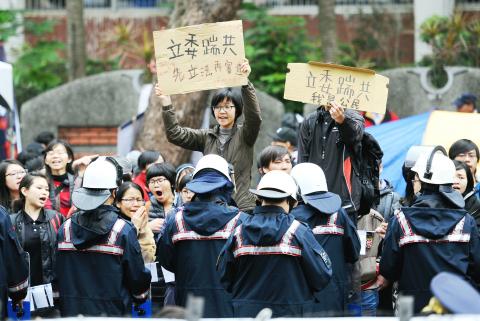Student activists occupying the legislative chamber yesterday rejected the Cabinet’s proposal for legislation to monitor cross-strait agreements, calling it an empty, insincere proposal aimed at deceiving the public.
“The Cabinet proposal is rather superficial, especially when [the premier] rejects our demand to apply the law to the review of the cross-strait service trade agreement,” student leader Chen Wei-ting (陳為廷) told a news conference at the Legislative Yuan.
“The proposal is empty, insincere and deceptive, and ignores the demands raised by the 500,000 people who took part in Sunday’s demonstration [in Taipei],” he said.

Photo: Chang Chia-ming, Taipei Times
None of the protesters’ five major demands were included: the public’s participation in the reviews of cross-strait pacts, making all information public, stipulating the government’s responsibilities, human rights protection and granting the legislature the actual power to review cross-strait agreements.
“We hereby declare that the Executive Yuan has flunked class, because it failed to respond positively to the public’s demands,” Chen said.
Academia Sinica associate research law fellow Huang Kuo-chang (黃國昌) said that he agreed with Chen.
“In the proposal for the legislation to monitor cross-strait agreements raised by non-governmental organizations [NGOs], the legislature is given full power to review any cross-strait agreements, and the government would be required to report to the legislature on plans to sign an agreement with China prior to the beginning of negotiations for such a pact,” Huang said.
These mechanisms are absent from the Cabinet’s version, he said.
Human rights protection is an important element for many countries when signing free-trade agreements (FTA) with other nations, he said.
“In many FTAs, there are clauses concerning human rights protection, such as stipulating a suspension of the agreement when human rights are violated, or providing a way to appeal for those who feel that their rights have been compromised by the agreement,” Huang said.
“Unfortunately, such a mechanism does not exist in the Cabinet’s proposal,” he said.
Huang said the NGOs’ draft proposal also stipulates that if the government negotiates an agreement with China that involves a change in the political “status quo,” the agreement would have to be voted on by the public in a referendum before being ratified, but that was not mentioned in the Cabinet’s version either.
Attorney Lai Chung-chiang (賴中強) said that according to the NGOs’ draft proposal, the government not only has to report to the legislature before negotiating an agreement with China, but it also has to hold public hearings in advance.
The Cabinet’s proposal that only national security agencies would need to review a cross-strait pact before it was signed was not enough, the attorney said.
“One of the controversies concerning the cross-strait service trade pact is that the government only held public hearings after the pact was signed,” Lai said.

Tropical Storm Gaemi strengthened into a typhoon at 2pm yesterday, and could make landfall in Yilan County tomorrow, the Central Weather Administration (CWA) said yesterday. The agency was scheduled to issue a sea warning at 11:30pm yesterday, and could issue a land warning later today. Gaemi was moving north-northwest at 4kph, carrying maximum sustained winds near its center of up to 118.8kph and gusts of 154.8kph. The circumference is forecast to reach eastern Taiwan tomorrow morning, with the center making landfall in Yilan County later that night before departing from the north coast, CWA weather forecaster Kuan Shin-ping (官欣平) said yesterday. Uncertainty remains and

SEA WARNING LIKELY: The storm, named Gaemi, could become a moderate typhoon on Wednesday or Thursday, with the Taipei City Government preparing for flooding A tropical depression east of the Philippines developed into a tropical storm named Gaemi at 2pm yesterday, and was moving toward eastern Taiwan, the Central Weather Administration (CWA) said. Gaemi could begin to affect Taiwan proper on Tuesday, lasting until Friday, and could develop into a moderate typhoon on Wednesday or Thursday, it said. A sea warning for Gaemi could be issued as early as Tuesday morning, it added. Gaemi, the third tropical storm in the Pacific Ocean this typhoon season, is projected to begin moving northwest today, and be closest to Taiwan on Wednesday or Thursday, the agency said. Today, there would likely

DISRUPTIONS: The high-speed rail is to operate as normal, while several airlines either canceled flights or announced early departures or late arrivals Schools and offices in 15 cities and counties are to be closed today due to Typhoon Gaemi, local governments announced last night. The 15 are: Taipei, New Taipei City, Taoyuan, Tainan, Keelung, Hsinchu and Kaohsiung, as well as Yilan, Hualien, Hsinchu, Miaoli, Chiayi, Pingtung, Penghu and Lienchiang counties. People should brace for torrential rainfall brought by the storm, with its center forecast to make landfall on the east coast between tonight and tomorrow morning, the Central Weather Administration (CWA) said. The agency issued a sea warning for the typhoon at 11:30pm on Monday, followed by a land warning at 11:30am yesterday. As of

CASUALTY: A 70-year-old woman was killed by a falling tree in Kaohsiung as the premier warned all government agencies to remain on high alert for the next 24 hours Schools and offices nationwide are to be closed for a second day today as Typhoon Gaemi crosses over the nation, bringing torrential rain and whipping winds. Gaemi was forecast to make landfall late last night. From Tuesday night, its outer band brought substantial rainfall and strong winds to the nation. As of 6:15pm last night, the typhoon’s center was 20km southeast of Hualien County, Central Weather Administration (CWA) data showed. It was moving at 19kph and had a radius of 250km. As of 3pm yesterday, one woman had died, while 58 people were injured, the Central Emergency Operation Center said. The 70-year-old